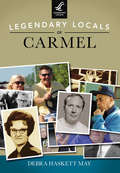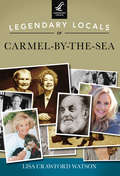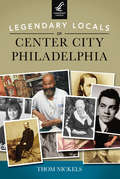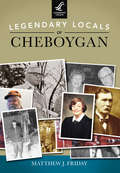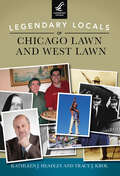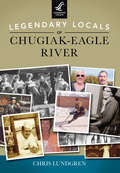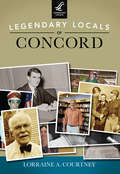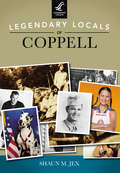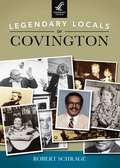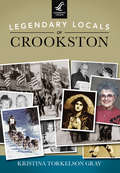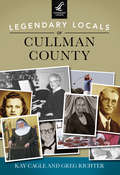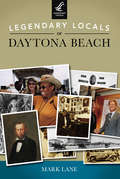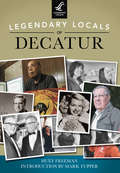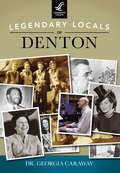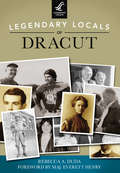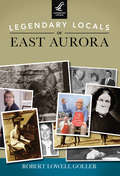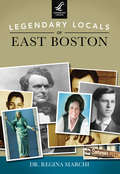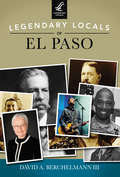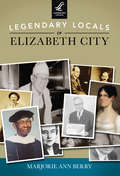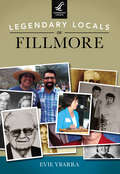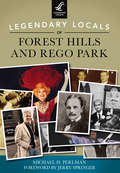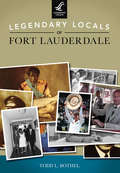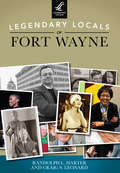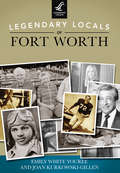- Table View
- List View
Legendary Locals of Carmel (Legendary Locals)
by Debra Haskett MayEarly Carmel settlers Silas Moffitt and William Kinzer found the area to be abundant for hunting and the soil rich for farming. Quaker in origin, the town's quest for importance in education was forefront and remains so today. With other dedicated leaders through a time of rapid growth in the mid-20th century, Robert Hartman and Dale Graham set the standard to make Carmel High School a respected rival in academic, sports, and extracurricular competitions. Beautiful art galleries, anchored by the Evan Lurie Building, dot the rejuvenated downtown Arts & Design District where Colonel Trester's blacksmith shop and O.W. Nutt's hardware store once stood. A far cry from tented summer church revivals, world-class musicians and performers now take the stage of the Palladium, an acoustically perfect and visually magnificent performing arts center. Visionary mayor James Brainard seeks a sixth term and hopes to continue on the same path of growth and renewal. The city has been voted one of America's best places to live, and Carmel's varied and colorful residents have been proving this since the 1830s.
Legendary Locals of Carmel-by-the-Sea
by Lisa Crawford WatsonA place whose history has long been a source of fable and fascination, Carmel-by-the-Sea is a community whose ancestors summered by the sea and ultimately stayed through the seasons. After founders Frank Powers and Frank Devendorf populated the once-barren potato patches with artists and academicians, it became a place defined as much by legends and landscape as by the characters who came to Carmel. Whether it is the clear light that attracted photographers Edward Weston, Ansel Adams, Doug Steakley, and Bob Kolbrener; the whisper in the trees, the rhythm of the waves, and the stillness at dawn that seduced writers Mary Austin, Robinson Jeffers, Jack London, Bob Campbell, Rick Masten, and Jane Smiley; or the unbridled beauty in a majestic mountain, surging sea, or verdant valley that drew in artists Mary DeNeale Morgan, William F. Ritschel, E. Charlton Fortune, Mari Kloeppel, Carol Chapman, and Loet Vanderveen, the truth is that Carmel-by-the-Sea gets in one's soul and makes its home there.
Legendary Locals of Center City Philadelphia (Legendary Locals)
by Thom NickelsPhiladelphia is a hard mistress when it comes to honoring native talent, and the city has more than its fair share of notable figures. Consider colorful politicians like Frank Rizzo and Richardson Dilworth, international celebrities like Grace Kelly, sports legends like Connie Mack, Philadelphia Museum of Art icons like Anne d'Harnoncourt, or national radio personalities like Terry Gross. Business tycoons such as John Wanamaker and Russell Conwell, founder of Temple University, made many contributions to the city. Pearl Buck, author of The Good Earth, and Christopher Morley, America's G.K. Chesterton, created legacies of their own. Other legends like the nearly forgotten Agnes Repplier, a world-famous essayist and contemporary of Henry James, and poet Daniel Hoffman, the designated US poet laureate in 1973-1974, have helped enrich the city's literary reputation. There are Marian Anderson, Mario Lanza, and Hollywood actor Kevin Bacon, whose fame is equaled by his city planner father, Edmund. Architects like Frank Furness, Louis Kahn, and Vincent Kling helped transform the city into an international destination. And there are many notables looming outside the margins of this book, waiting for their day of discovery.
Legendary Locals of Cheboygan
by Matthew J. FridayFounded as a lumbering town in the mid-1800s, Cheboygan has transformed over the years to be something much less simplistic and much more dynamic; so, too, have its people. While some of Cheboygan's residents played important roles in business or commerce, others made their mark through philanthropic work, service to the community, or just by their demeanor. History is as much about people as it is about events--people like Gordon "Scoop" Turner, who came to Cheboygan for a few months but ended up staying for a lifetime. There are businessmen like Millard D. Olds, who became one of the most successful lumbermen at a time when others were leaving town, and George M. Humphrey, the 55th treasurer of the United States. An eye towards the community has also made some residents legendary, such as Joyce and Quincy Leslie. And, of course, there are those whose history is shrouded in controversy, including Sheriff Fred Ming, under whose authority a Native American village was burned to the ground. Whatever their story, these locals have contributed to the character and history of Cheboygan.
Legendary Locals of Chicago Lawn and West Lawn (Legendary Locals)
by Kathleen J. HeadleyFrom West Palm Beach's beginnings as service town to Palm Beach, Standard Oil tycoon Henry Morrison Flagler's resort village, the city has evolved into a trendy art, cultural, and shopping mecca. Palm Beach County's largest city serves as county seat and center of business, government, and commerce. Taming America's last frontier saw the industriousness of pioneers and settlers such as Marion Gruber, the Potter brothers, George Lainhart, and Max Greenberg guide the "Cottage City" of yesteryear to today's gleaming metropolis. Meet many of West Palm Beach's pioneers, civic leaders, educators, business leaders, and entrepreneurs. Learn about the heroes, celebrities, philanthropists, and even the villains who have contributed to the mosaic of West Palm Beach.
Legendary Locals of Chugiak-Eagle River
by Chris LundgrenHomesteading in Alaska was not an obvious lifestyle choice for most people in post-World War II America. In an age of gleeful consumerism, early settlers of Chugiak-Eagle River made a decision to live simply. Yet a simple life and an easy one were two different things. Many raised their own crops and a few, such as the Pippels, the Tatros, the Glenn Briggses, and the Vanovers, created larger-scale farming ventures. Other entrepreneurs, such as Paul Swanson, thrived in the frontier environment, taking on multiple enterprises to fill gaps in the area's services. Out of this can-do atmosphere sprang a number of artists, musicians, and performers. The Chugiak Belles dance group revved up audiences at the annual Spring Carnival, and the Chugiak Players staged a variety of dramas and comedies. Eagle River homesteaders Arthur and Eleanor Braendel helped found the Anchorage Symphony Orchestra and performed with them for 60 years. Radio host and homesteader Ruth Briggs sang and traveled with the original Anchorage Concert Chorus. As the area matured and schools grew, athletes began to thrive, creating their own legacy. More legendary locals are being minted every day.
Legendary Locals of Concord (Legendary Locals)
by Lorraine A. CourtneyThe land now called Concord was originally inhabited by the Abenaki people and the Penacook tribe. Concord's first settlers, such as Ebenezer Eastman, began laying out the Plantation of Penacook, as it was known in 1725, along the fertile fields of the Merrimack River. It was incorporated in 1734 as Rumford and then renamed to Concord by Gov. Benning Wentworth in 1765. Concord experienced a surge in transportation and manufacturing in the 19th century, producing the Concord Coaches, Prescott Pianos, and steam boilers. As Concord celebrates its 250th anniversary, the city flourishes as the state capital and has a thriving community of restaurants, entertainment, and culture for all to enjoy. It retains its town sensibility as it plans for the continued growth of the local economy. Today's civic leaders, like Byron Champlin and James Carroll, work conjointly with business leaders, such as Tom Arnold of Arnie's and Juliana Eades of the New Hampshire Community Loan Fund, to build and enhance Concord's cultural, social, and economic identity.
Legendary Locals of Coppell
by Shaun M. JexCoppell has produced a wealth of personalities that could have leapt from the pages of a novel. The town's early days brought John and Sarah Stringfellow, who helped found the town's oldest church, and Josiah and John Record, a father-and-son duo who were victims of lynching. The coming of the Cottonbelt Railroad created the mystery of town namesake George Coppell. The town was home to farmers like domino-loving Buren Ledbetter and sharecropper W.A. Ottinger. It had its own "Floyd the Barber" (Floyd Harwell), as well as Jo Jackson, the librarian known to most as the "Bird Lady of Coppell." The town has produced a wealth of heroes like Carroll Kirkland, who was killed in World War II, and Jacob Schick, a decorated veteran of the Iraq War. It is also a town that has turned tragedy into triumph through stories like Todd and Tara Storch, who transformed the pain of their daughter Taylor's death into the life-giving charity Taylor's Gift. Together their stories tell the story of Coppell, a place that at its heart will always be a small town.
Legendary Locals of Covington (Legendary Locals)
by Robert SchrageCovington was a natural place for people to settle. Located on the banks of the Ohio and Licking Rivers, it developed quickly as the urban core of northern Kentucky. Sitting just opposite of Cincinnati, Ohio, it was a great location for travel by both animals and people. Originally owned by Thomas Kennedy, the land was ultimately purchased by Thomas Carneal and John and Richard Gano, and thus the city of Covington was founded in 1815. Not long after its establishment, railroads made Covington their home and many other businesses followed. By 1850, it was the second-largest city in Kentucky. Over its 200 years, Covington has seen many people play a role in its history, development, and reputation. Some are great business and community leaders. Others made tremendous contributions to the arts, and some are notorious. A community is defined more by its people than its buildings and streets. The individuals who have lived and worked in Covington provide a colorful insight into its past. From its founding until the present day, these individuals are a fascinating look into the city's history.
Legendary Locals of Crookston
by Kristina Torkelson GrayCrookston is in the heart of the fertile Red River Valley. Railroad baron James J. Hill positioned the city to be a hub of transportation, so Civil War veterans and railroad workers settled Crookston first. At Hill's behest, a long tradition of learning how to "farm smart" started with the Northwest School of Agriculture in 1906. Facing a short growing season, farmers stayed close to the soil and invented better implements to harvest the area's bounty. The tradition of improving technology continues from the century-old practices begun at the Experiment Station. Currently, precision agriculture is taught at the University of Minnesota, Crookston's "laptop university." Familiar family names from Crookston's retail sector have prevailed throughout the farmers' cycle of boom and bust. Many other talented personalities shine through, especially those skilled in sports and music. Also included in this volume are unsung heroes for their acts of kindness and volunteerism.
Legendary Locals of Cullman County (Legendary Locals)
by Greg Richter Kay CagleIn search of opportunity and freedom from oppression, European emigrants boarded ships, leaving behind their ancestral homes. They carved new lives from the unknown wilderness in the American South. The Speegle family settled in what would become southwest Cullman County, and the Brindley family claimed lands to the north. From the historic Streight's Raid exploit of the Civil War to the agricultural and social development of this region of northern Alabama, these early pioneers marched into history. In 1865, Col. Johann G. Cullmann, who was disillusioned with the anarchism in his native Germany, also sought new opportunity in America, eventually settling in Alabama. After being enticed by Colonel Cullmann's descriptive words of the area's virgin timber and fertile soils, ?ve German families joined him. Encouraged by what they found, optimism flourished, word spread, and Cullman County's destiny was set. Its growth has been constant, and, today, its expansion is propelling the area to new heights of economic prominence.
Legendary Locals of Daytona Beach
by Mark LaneSince the 1920s, Daytona Beach has sold itself as "The World's Most Famous Beach," which, while not literally true, does suggest a city with a big personality and large plans. The people in these pages contributed to that personality and made those plans. These people include Matthias Day, the Ohio industrialist, educator, inventor, and newspaper editor who founded and gave his name to the new city in 1876; Mary McLeod Bethune, the daughter of former slaves, who founded the university that bears her name "with five little girls, a dollar and a half, and faith in God"; Bill France Sr., the race driver and promoter who took stock car racing from the beach sands to a state-of-the-art track and built a racing empire; and his son, Bill France Jr., who turned NASCAR into a national pastime. Other notable Daytonans include the builders, writers, artists, rockers, promoters, business founders, educators, journalists, politicians, pioneers, bootleggers, philanthropists, sports stars, and even a dog that made the city what it is today. They come to life in historical photographs from the Halifax Historical Museum, the Florida Archives, and files of the Daytona Beach News-Journal.
Legendary Locals of Decatur (Legendary Locals)
by Huey Freeman Mark TupperA working-class city of 75,000 people on the banks of the Sangamon River and its largest lake, Decatur has a reputation for outstanding individuals with a strong community spirit and an unashamed sense of patriotism. To borrow a phrase from Adm. Chester Nimitz, in Decatur, uncommon dedication is a common virtue. Harold Miller fought at Iwo Jima with a Marine tank battalion, before serving 32 years on the Decatur Police Department. Wayne and Leslie Kent, ministers at First Christian Church, risked their freedom to bring music and encouragement to oppressed believers in the Soviet Union and Poland. George Halas, a Navy veteran, was player-coach for the Decatur Staleys football team (later the Chicago Bears), a charter franchise in the professional association that would become the NFL. Bob Fallstrom, a World War II soldier before working as a newspaper reporter and editor in Decatur for more than 65 years, has promoted numerous community causes. Legendary Locals of Decatur pays tribute to those who have made this community truly unique.
Legendary Locals of Denton (Legendary Locals)
by Dr Georgia CarawayDenton, Texas, was founded in 1857 because residents needed a location near the geographic center of Denton County to house a county seat. The city is located 39 miles north of two larger cities, Dallas and Fort Worth, and the three of them form what is often referred to as the "Golden Triangle." Denton, the peak of that triangle, is the "North Star," and its residents, past and present, certainly are superstars--superstars such as Bob Rogers, the beloved "Piano Man;" Mary Evelyn Blagg Huey, a quintessential leader; and Hal Jackson, an ace war hero and lawyer. Their accomplishments burst forth from the chapters of this book to outshine others with their generosity, talents, skills, community activism, adventurous spirits, energy, civic pride, business acumen, courage, and creativity. Citizens of Denton are proud to say, "Our history defines our community." The images and words between these covers illustrate why it should be added, "And our people define our history."
Legendary Locals of Dracut
by Rebecca A. Duda Maj. Everett HenryEstablished in 1669 as a small farming village on the banks of the Merrimack River, Dracut's early settlers made their mark during the American Revolution. From French nobleman Louis Ansart, who became an American citizen and settled in the area, to Dracut's own Joseph Bradley Varnum, the town played a pivotal role in the founding of the nation. More recently, Dracut continues to be the home of modern-day patriots such as Michael Monahan, who left college to serve in the Vietnam War, and Capt. John Ogonowski, who gave his life on September 11, 2001. Dracut has been home to numerous other local legends--Dr. Christos Daoulas was the longest-serving Massachusetts school superintendent, and Dennis Piendak oversaw incredible growth and expansion during his 28 years as town manager. Dracut was also home to the indomitable Polly Urquhart, whose name now graces the corner where her store once stood; Rev. Larry Zimmerman, the pastor of the Old Yellow Meeting House for 33 years; and Edmund Murphy, the dean of Massachusetts high school football coaches. These are a few of the many amazing people who came from a town that was once known as simply "the wildernesse north of the Merrimac."
Legendary Locals of East Aurora (Legendary Locals)
by Robert Lowell GollerNestled along the banks of Cazenovia Creek, East Aurora is a cultural center of western New York State that has flourished because of the diverse talents of its people. Native Americans lived in East Aurora for thousands of years before the first settlers came to the area in 1804. One of the first pioneers, Martha Richardson Adams, carried her infant child on horseback all the way from Massachusetts. East Aurora grew rapidly after the War of 1812, evolving into an important business center south of Buffalo. By the 1880s, the village had become a horse-racing capital, where thousands came to Cicero Hamlin's farm to get a glimpse of his legendary horse, Mambrino King. As the century came to a close, hundreds of creative types were drawn to the Roycroft Campus, where Elbert Hubbard had established an arts and crafts colony. Despite modern developments, East Aurora remains a small village at heart, where the owners of the barbershop, bookstore, pharmacy, coffee shop, theater, and old-fashioned 5 & 10 still greet you at the door.
Legendary Locals of East Boston
by Dr Regina MarchiOnce a rural paradise known as "Noddle's Island," East Boston is the site of key developments in the nation's history, including the first naval battle of the American Revolution, the creation of the world's fastest sailing ships, the country's first underwater tunnel, and the nation's first public branch library. It has had its share of famous residents, from Colonial governor John Winthrop and repentant Salem witch trial judge Samuel Sewall, to clipper ship builder Donald McKay and the world's first female clipper ship navigator, Mary Patten. Women's suffrage activist Judith Winsor Smith called East Boston home, as did the first Civil War nurse, Armeda Gibbs; Massachusetts governor John Bates; and Boston mayor Frederick Mansfield. Pres. John F. Kennedy's paternal grandparents and father were born in East Boston, where they started their first businesses and political ventures, and the neighborhood has produced numerous community activists, musicians, artists, writers, and athletes.
Legendary Locals of El Paso (Legendary Locals)
by A. Berchelmann IIIFrom a small settlement along the Rio Grande to a major metropolitan area at the crossroads of three states and two nations, El Paso has grown immensely. Known as the "Sun City," the region has always attracted individuals and families from around the world who were looking to establish roots and make their mark. In the early days, pioneers such as Zach White, Anson Mills, and Joseph Magoffin helped lay a solid foundation on which the city was built. Gunfighters like John Wesley Hardin walked the streets of El Paso, while lawmen like Dallas Stoudenmire did their best to keep them off. Lining the streets of El Paso were, and still are, beautiful edifices designed by famed architect Henry Trost. El Paso's unique location, history, and culture have helped inspire many artists, writers, and musicians, such as Jim Ward, Cormac McCarthy, and Tom Lea. Take a moment and learn about some of El Paso's legendary locals.
Legendary Locals of Elizabeth City (Legendary Locals)
by Marjorie Ann BerryElizabeth City is rich in legend and lore. The pirate Blackbeard was a frequent visitor to the area, selling his ill-gotten goods to a willing populace. The Wright brothers made Elizabeth City the first leg of their trips to Kitty Hawk, and they bought materials to build their flying machine from Kramer Brothers, a local lumberyard. Champion nine-ball player Luther "Wimpy" Lassiter was born and died here. Young "Beautiful Nell" Cropsey was murdered in 1901; her death is the town's most enduring mystery. Newspaperman W.O. Saunders, editor of the Independent, was known nationally after he walked down New York's Fifth Avenue in pajamas to protest uncomfortable work attire. Young Tamsen Donner, a member of the ill-fated Donner Party, was a teacher here in the 1830s. Fred Fearing's Rose Buddies welcomed boaters to Elizabeth City with homegrown roses and wine and cheese parties. He has entertained Walter Cronkite and Willard Scott, among other luminaries. These are just a few of the stories, mysteries, and legends of Elizabeth City's past and present.
Legendary Locals of Estes Park (Legendary Locals)
by Steve MitchellIn the 1870s, ranchers Abner Sprague, William James, and Alexander MacGregor raised cattle while the Earl of Dunraven bought land for a private hunting reserve. It was neither cows nor hunting that defined Estes Park, though. Visitors were attracted to its beauty and crystalline mountain air. Inspired by conservationist John Muir, Enos Mills preserved the area's splendor by spearheading the establishment of Rocky Mountain National Park while F.O. Stanley welcomed guests to his regal Stanley Hotel, the inspiration for Stephen King's novel The Shining. As cars replaced horses downtown, Charlie Eagle Plume entertained visitors with Indian dancing, and "Casey" Martin offered children rides on his Silver Streak train. In the off-season when tourists were scarce, grocer Ron Brodie extended credit to the locals, and George Hurt ran lifts for skiers at Hidden Valley. But it was adversity that tested the town and defined its character. After the 1982 Lawn Lake Flood inundated Elkhorn businesses, town officials revitalized the downtown landscape with urban renewal. When the devastating 2013 flood washed out mountain roads and isolated Estes Park, local businesses banded together and were "Mountain Strong."
Legendary Locals of Fillmore
by Evie YbarraSince its beginning as a Southern Pacific Railroad town 100 years ago, Fillmore has been the setting of many legends and true tales, like the St. Francis Dam disaster, the 1994 earthquake, and the Hollywood film shoots. Joaquin Murietta hid in the hills, and the story of the T. Wallace More murder in Rancho Sespe in 1877 was the "murder of the century." Rancho Camulos, owned by the del Valle family until 1924, signifies the last of the Californios. Today, it is owned by the descendants of August Rubel. Tales of the sycamore tree abound, and it is an icon on Highway 126, as is the tower of the Sanitary Dairy, which was ordered from the Sears, Roebuck & Company in Chicago. Oil was discovered early in Shiells Canyon and brought Texaco to town. The fruit industry prospered, and Sunkist was welcomed. Hugh Warring installed indoor plumbing in the Piru Mansion. The likes of "Booty" Sanchez, Marcelino "Woody" Ybarra, Gene Wren, Kevin Gross, Jim Fauver, and Dorothy Shiells still influence the community.
Legendary Locals of Forest Hills and Rego Park
by Michael H. Perlman Jerry SpringerIn 1906, Cord Meyer Development Company purchased 600 acres in Whitepot and renamed it Forest Hills after its high elevation of rolling hills and proximity to Forest Park. After the Russell Sage Foundation acquired 142 acres and Grosvenor Atterbury and Frederick Law Olmsted Jr. partnered, the Forest Hills Gardens, founded in 1909, became America's earliest planned garden community. When Henry Schloh and Charles Hausmann of the Rego Construction Company came upon farmland in Forest Hills West, they renamed it Rego Park in 1923 after their slogan, "REal GOod Homes." Between the Tudor and Colonial landmarks, one can sense the footsteps of a few hundred notables who granted soul to the community and society. At the Forest Hills Tennis Stadium, imagine the Beatles landing in a helicopter in front of screaming fans in 1964, or when Althea Gibson became the first African American to win a US national tennis title in 1957. Forest Hills High School was a cornerstone for notable alumni, such as composer Burt Bacharach; musical duo Simon & Garfunkel; Bob Keeshan, who portrayed Captain Kangaroo; and the first space tourist, Dennis Tito.
Legendary Locals of Fort Lauderdale
by Todd L. BothelFrom the first settlers, the Lewis family in the 1790s, to the New River Settlement led by William Cooley in the 1830s, to the arrival of Frank Stranahan in 1893, Fort Lauderdale is an "old" young town. Named for the Second Seminole War fort commanded by Major Lauderdale, the town incorporated in 1911. The land boom of the 1910s-1920s brought an influx of people including publicist Commodore Brook, architect Francis Abreu, developer Charles Rodes, and businessmen Moe and Mack Katz. Following the economic downturn after the 1926 hurricane, the postwar boom transformed the sleepy town into the tropical paradise and tourist destination that it is today. Hotelier Bob Gill, developer James Hunt, "Crazy Gregg" Newell, and entrepreneur Wayne Huizenga led that charge. Legendary Locals of Fort Lauderdale also tells the story of groundbreaking civil servants such as Easter Lily Gates and Andrew DeGraffenreidt, civil rights activists Eula Johnson and Dean Trantalis, educators Mae McMillan and Sister Marie Schramko, and sports stars Katherine Rawls, Chris Evert, and Ryan Hunter-Reay.
Legendary Locals of Fort Wayne
by Randolph L. Harter Craig S. LeonardFort Wayne sits astride the confluence where the St. Joseph and St. Mary's Rivers form the Maumee River. Though occupied for over 10,000 years, its modern history begins just over 200 years ago with Gen. Anthony Wayne and his Miami nemesis, Chief Little Turtle. The pageant of Fort Wayne's history includes traders, industrialists, politicians, athletes, and movie stars. Included here are such notables as Hollywood's Carole Lombard and Shelley Long, Ian Rolland of Lincoln Life, Big Boy's Alex Azar, gangster Homer Van Meter, football's Rod Woodson, inventor Philo Farnsworth, and over 150 more.
Legendary Locals of Fort Worth (Legendary Locals)
by Emily White Youree Joan Kurkowski-GillenFort Worth is �the City of Cowboys and Culture��and where the West begins. Its citizens highlight the Texas can-do spirit and the determination and compassion to make a difference, to be legendary. When Buckley (B.B.) Paddock persuaded the railroad to lay track west of Dallas, a city was born and so was opportunity. Cowboys like T.J. Ryon rode into town with their cattle. J. Frank Norris preached against the vices in Hell�s Half Acre while Jennie Schueber tried to rally support for a free library. Feisty entrepreneurs like Ninnie Baird and John B. Laneri baked bread and sold pasta noodles. �Cowtown� also boasts such notables as Edna Gladney, who helped countless orphans find a home; the Clark brothers, who brought Texas Christian University home; and Claude R. Platte, who bravely served as a Tuskegee airman. These fine folks are just a sampling of Fort Worth�s fascinating�and sometimes infamous�characters.
